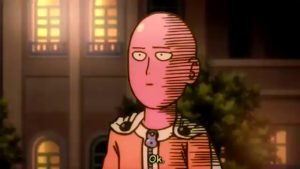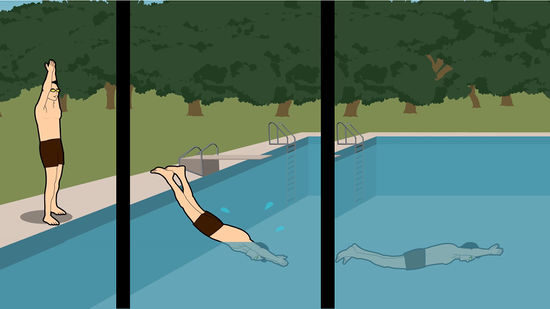I chose to do a rhetorical analysis of one of my favorite shows and pieces of modern culture, One Punch Man. Creator One comments on the dangers of reducing life’s struggles by exploring a unique theme that rarely comes up in our modern superhero landscape, what happens if you get too strong? Conventional narratives, from romantic comedies to summer action blockbusters, are driven by conflict. Typically narratives have an overarching problem that gives the characters some purpose, whether in training in order to win the big boxing match, going back in time in order to save the world, or winning the heart of the girl who’s out of your league, conflict is what moves a story along. One Punch Man subverts this by making the main character so powerful that no villain could ever defeat him and chooses to show just how unsatisfying that would be and uses that to explore larger implications about where our society is heading.
To understand the works of author One you have to first understand his background. Born in Saitama, Japan, One had a fairly normal upbringing. He went to school, got decent grades and got a decent job in the business world. One quickly gained a feeling of being unfulfilled and did something bold, after working for a full year and saving as much as he could he quit to begin writing and illustrating his own web comic. While not being the best artist his work picked up a lot of traction and a professional illustrator stepped in. With this partnership One Punch Man was born. Knowing this is important because One channeled his feelings being dissatisfied with a comfortable office life into his story even naming his main character after his hometown, Saitama.
Saitama represents what happens to a life when you remove challenge. Beginning the story as a disillusioned young man with a full head of hair searching for a job in business, he discovers a passion for hero work that, for the first time in his life, lights a fire in his eyes. But three years later, the thrill is gone, along with this his trademark anime hair and he has gained the power to end any fight in just one punch. His encounters with villains often start by him claiming to be a “hero for fun,” but Saitama doesn’t seem to be enjoying what he is doing at all. In the first episode of the series Saitama obliterates a monster that is destroying the city and falls to his knees, not in celebration but only to mutter “Not again.” (The Strongest Man, 0:00-2:45) There is no satisfaction in what he is doing because “All it took was one punch!” (2:37) Saitama’s ability to defeat any foe in one punch leaves his life feeling hollow and frankly disappointing. Without the need to struggle Saitama is left joyless. Throughout the series Saitama never evolves because he never faces any real adversity and this leads him to feel continually unfulfilled.
Just as a story requires conflict to progress, so do we as human beings. This is the underlying theme of One Punch Man. The idea of struggle detracting from life’s value is addressed when hero Saitama reacts to a group of lazy villains calling themselves the Paradisers. For these villains, paradise means success without any effort. Saitama hears that they will continue rioting until free food, water and housing are given to those who do not want to work and he thinks from his own experience “Sounds boring.” (The Modern Ninja, 4:48-5:24). The Paradisers are a commentary on society doing everything it can to end struggle. This is a demonstration of a problem arising in our own world. The depiction of a group of people seeking to end challenge, just like a certain bald headed protagonist, the people in our world can get lost in their pursuit of diminishing hardship and end up losing more than they bargained for.
One Punch Man shows the hollowness of the human experience in the absence of struggle. The show becomes a warning of the mundane future we face in modern society where reducing struggle is our main objective. Japanese philosopher Masahiro Morioka explains this in his book Painless Civilization: A Philosophical Critique of Desire, “A civilization without pain and suffering seems to be the ideal of the human race. However, I wonder if people might end up with losing sight of joy, and forgetting the meaning of life, in a society pervaded by pain reduction mechanisms….” (3) Morioka argues that this painless world the Paradisers are striving for will leave our existence meaningless.
One Punch Man deconstructs the idea of being a superhero into being a boring dayjob. It begins by showing us the villainous embodiment of evolution in Dr. Genus. Exiled from the scientific community he spends fifty years trying to unlock the key to humanity’s evolution. Thinking that evolution is the key to finding life’s meaning Dr. Genus devotes himself to creating the pinnacle of evolution in his mentally unstable creature, Carnage Kabuto. Believing himself to be the strongest being on the planet Carnage has a unique swagger about him and exudes confidence, becoming one of the most sadistically fulfilled characters the show presents. As any watcher of the show is expecting all this buildup is yet again undercut. This time when Carnage Kabuto gets Saitama to reveil training regiment, usually an opportunity to depict a character’s mental and physical development, it turns out to be the same simple muscle workout. “One hundred pushups, one hundred situps, one hundred squats, and a ten kilometer run everyday!” (The Obsessive Scientist, 17:33-18:41) The ease with which he reached superhero status robs the supporting characters of any meaning they’ve derived from their struggles. Saitama has ungodly power and the worst part is he didn’t do anything special to deserve it, he isn’t the chosen one or an alien sent to be an example for mankind, he really is just a twenty five year old guy who’s unsatisfied at work. The episode ends with Saitama destroying Carnage in an instant and after he complains that he missed the sale at the supermarket.
One Punch Man shows meaningful lives through its side characters. In contrast to the ultimate powerful hero Saitama we Genos and Mumen rider. Mumen Rider is a “Class C” hero who has no power to stop any villains. It’s easy to identify with Mumen because he’s an earnest underdog, clearly less powerful than the uber strong heroes introduced prior. In episode “Unyielding Justice” Mumen Rider is facing off against the Deep Sea King, a powerful villain who has defeated many heroes, Mumen is severely outclassed but brings a crowd of civilians to tears with his speech and is the most emotionally resinate moment in the entire show “I know no one expects much from me…but I must fight you anyway…It’s not about winning or losing! It’s about me taking you on right here, right now!” (7:10-8:59) This speech is impactful because Mumen Rider is trying to overcome a great challenge and is giving everything he has to do so. This encounter is meant to stir up feelings inside the view of trying to measure up to someone that’s bigger, smarter, or stronger than us. Just when you feel that hard work and true grit will pay off Mumen rider is defeated in a single punch and it is no other than Saitama who arrives to effortlessly save the day, thinking to himself “That was lame. I kinda had my hopes up too.” (10:52-11:12) A traditional narrative wouldn’t stray away from having the underdog winning after a moment of powerful emotion, but that’s what makes One Punch man different, instead we see the character we identify with defeated in an instant and our hopes are undercut by one effortless punch.
By subverting typical storytelling techniques and exposing our need for struggle One Punch Man delivers it’s final blow, life needs conflict to be meaningful. By weaving together the intense or tragic motivations of the supporting heroes and villains with Saitama’s unlimited yet unfulfilling power One offers an interesting perspective on future we may be heading towards. In the world of One Punch man we find a message: spend less time trying to minimize the hardships in life, instead enjoy the satisfaction that comes from overcoming them.



